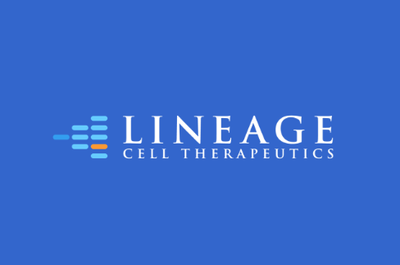

- Home
- Companies
- Lineage Cell Therapeutics, Inc.
- News
- Lineage Announces a Fifth Cell Therapy ...
Lineage Announces a Fifth Cell Therapy Program: Allogeneic Photoreceptor Transplants for the Treatment of Diseases Which May Lead to Blindness
Lineage Cell Therapeutics, Inc. (NYSE American and TASE: LCTX), a clinical-stage biotechnology company developing allogeneic cell therapies for unmet medical needs, today announced a new cell therapy development program: photoreceptor neural cell (PNC) transplants for the treatment of vision loss due to photoreceptor dysfunction or damage. Similar to the company’s recently announced pipeline expansion into auditory neurons for the treatment of hearing loss, Lineage has filed for intellectual property protection covering the composition and methods for generating PNCs. Based on recent in vivo data generated using the company’s PNCs, these cells may be capable of forming reconstructed retina with high survivability and neural connectivity to surrounding functional layers. Notably, Lineage has demonstrated feasibility which could support a large-scale method for producing both types of photoreceptors, known as rods and cones.
“It is natural that, on the heels of the announcement of our alliance with Roche and Genentech for our RPE cell therapy, a deal worth up to $670 million dollars plus double-digit royalties if certain development, approval, and sales milestones are achieved and other conditions are met, that we also would pursue treatments for vision loss through the other major cell type of the retina, the photoreceptors,” stated Brian Culley, Lineage’s CEO. “Our fundamental technology and accumulated know-how give us the opportunity to make many different cell types, and we have demonstrated our ability to create new programs rapidly and efficiently in two distinct areas, expanding our cell therapy pipeline to five separate preclinical and clinical programs, while still maintaining what we believe is an appropriate and responsible rate of investment for a company of our size. This latest program is part of our long-term planning for clinical and commercial success and serves as another example of the capability of our technology platform. We believe our ability to, in just a matter of months, advance from a product concept to generating new intellectual property and manufacturing the desired cell types, is illustrative of the power and efficiency of our platform. We believe the combination of our capital discipline and current balance sheet will support multiple years of further progress, during which we anticipate reaching achievements with each of our clinical and preclinical programs.”
Dr. Rami Skaliter, who leads the manufacturing function for Lineage, added, “I’m exceptionally proud of the team’s success at overcoming obstacles related to the limited scale of photoreceptor production. Building upon our experience with other cell lineages, we have developed intellectual property, and filed for patent protections, on a manufacturing process which is compatible with large-scale production of photoreceptors in a closed system, improvements which could enable industrial manufacturing. We believe this accomplishment will provide new opportunities for clinical, and ultimately commercial, production of photoreceptors in areas of large unmet need such as Retinitis Pigmentosa, Stargardt’s Macular Dystrophy, and retinal detachments, either independently or through strategic alliances.”
As part of a scientific collaboration with Professors Benjamin Reubinoff, M.D., Ph.D. and Eyal Banin, M.D., Ph.D., of the Hadassah-Hebrew University Medical Center, the differentiation of pluripotent cells into photoreceptors with clinically compatible characteristics was established utilizing a novel differentiation protocol which generated positive identity of key markers of both rods and cones photoreceptor populations. The data generated by the company further demonstrated that a single cell suspension of photoreceptor precursor cells has the potential to survive and mature post-transplantation in a rodent model of retinal degeneration.
About Lineage Cell Therapeutics, Inc.
Lineage Cell Therapeutics is a clinical-stage biotechnology company developing novel cell therapies for unmet medical needs. Lineage’s programs are based on its robust proprietary cell-based therapy platform and associated in-house development and manufacturing capabilities. With this platform Lineage develops and manufactures specialized, terminally differentiated human cells from its pluripotent and progenitor cell starting materials. These differentiated cells are developed to either replace or support cells that are dysfunctional or absent due to degenerative disease or traumatic injury or administered as a means of helping the body mount an effective immune response to cancer. Lineage’s clinical programs are in markets with billion dollar opportunities and include five allogeneic (“off-the-shelf”) product candidates: (i) OpRegen, a retinal pigment epithelium transplant therapy in Phase 1/2a development for the treatment of dry age-related macular degeneration, which is now being developed under a worldwide collaboration with Roche and Genentech, a member of the Roche Group; (ii) OPC1, an oligodendrocyte progenitor cell therapy in Phase 1/2a development for the treatment of acute spinal cord injuries; (iii) VAC2, a dendritic cell therapy produced from Lineage’s VAC technology platform for immuno-oncology and infectious disease, currently in Phase 1 clinical development for the treatment of non-small cell lung cancer (iv) ANP1, an auditory neuronal progenitor cell therapy for the potential treatment of auditory neuropathy, and (v) PNC1, a photoreceptor neural cell therapy for the treatment of vision loss due to photoreceptor dysfunction or damage.
